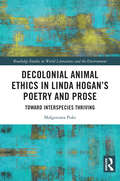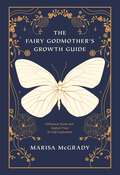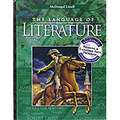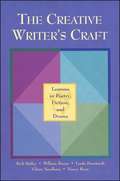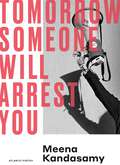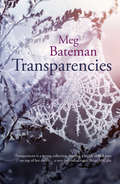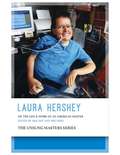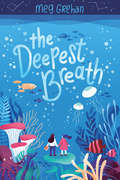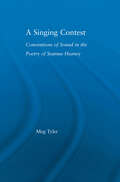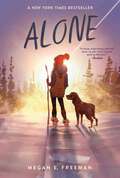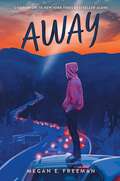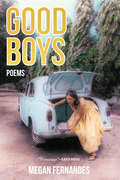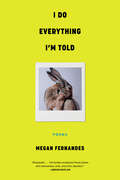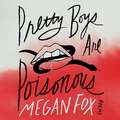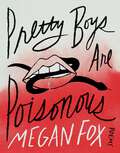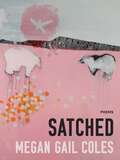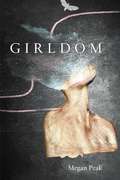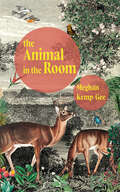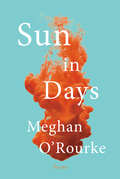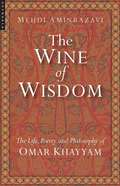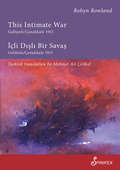- Table View
- List View
Decolonial Animal Ethics in Linda Hogan’s Poetry and Prose: Towards Interspecies Thriving (Routledge Studies in World Literatures and the Environment)
by Małgorzata PoksInterspecies cosmopolitanism—understood as an effort to build a pluriversal world in which multiple forms of life can coexist—is all the more urgent in a world of already entangled biosystems, multispecies contact zones, and human/more-than-human interfaces. Critiquing the liberal discourse on animal rights for perpetuating colonial hierarchies, this volume argues that imagining a human-animal cosmopolis should be done in dialogue with traditional tribal cultures, which envision animal persons as agential beings, teachers, and relatives of the humans they have coevolved with. Steeped in North America’s Indigenous worldviews, it focuses on such questions as: who are the animals we share our earthly lives with, what can they teach us about ourselves, how can animals guide us toward more sustainable futures, and what are the conditions of possibility of human-animal thriving? This is also the first book-length study of Linda Hogan’s prose and poetry written from decolonial animal studies perspective.
The Fairy Godmother's Growth Guide: Whimsical Poems and Radical Prose for Self-Exploration
by McGrady McGradySocial media sensation Marisa McGrady is the Fairy Godmother with a self-help guide that isn't one-size-fits-all. . .Modern media makes self-love seem simple. Buy a bath bomb, apply a face mask, and voila! You&’ve got self-love, commodified and canned for your convenience. But self-love cannot be bought. There is no &“one-size-fits-all&” approach to self-care. What happens once our bubble baths drain and feelings of self-loathing, doubt, or despair creep back in? How do our bodies, resource availability (including free time), and physical and emotional needs impact our ability to care for ourselves? Are our bodies &“bad&” just because certain industries, organizations, or people deem them so? Social media sensation Marisa McGrady, also known as @ris.writes or the Fairy Godmother online, explores these questions and more in her debut self-help book, The Fairy Godmother&’s Growth Guide: Whimsical Poems and Radical Prose for Self-Exploration. The bite-sized poems in Part I propose new perspectives about our bodies that inspire us to see ourselves in different lights. The prose in Part II explains accommodating, sustainable approaches to self-care while addressing the harms of industrialized self-love and exploring the internal concepts and external factors that impact self-worth. The Fairy Godmother&’s Growth Guide will redefine your relationship with yourself and help you make your life more magical.
McDougal Littell Literature (Indiana Grade 8 Edition)
by Mcdougal LittellMcDougal Littell Literature invites students to explore the world of art, literature, and life's big questions. Students analyze fiction, nonfiction, poetry, drama, and media across clusters of standards. Special features support visual and media literacy, along with research strategies.
The Language of Literature (Grade 8, California Edition)
by Mcdougal LittellLiterature textbook for California 8th graders.
The Creative Writer's Craft: Lessons in Poetry, Fiction, and Drama
by Mcgraw-Hill Staff Richard BaileyThe Creative Writer's Craft is organized by genre into three sections - Poetry, Fiction, and Drama. It offers students the opportunity to explore and develop crafting skills for writing various types of poems, short stories, and one act plays. The lessons and writing activities encourage students to develop a writer's attitude, embracing the writing process rather than the final result.
Main Maseeha Nahin: मैं मसीहा नहीं
by Sonu Sood Meena K. Iyerकभी-कभार ब्रह्मांड का कोई छोटा सा संकेत इंसान को उसके जीवन का उद्देश्य ढूँढ़ने में मदद कर देता है। अगर अभिनेता सोनू सूद एक मशहूर हस्ती के रूप में अपने शानो-शौकत से भरे जीवन को तवज्जो देते रहते और सिर्फ रिमोट कंट्रोल से अपनी उदारता दर्शाते, तो वह कभी भी भारत के प्रवासी मजदूरों के दर्द से रूबरू नहीं होते या कभी यह नहीं समझ पाते कि भोजन का महज़ एक पैकेट कभी भी किसी मजदूर को घर भेजे जाने के इंतज़ाम का विकल्प नहीं हो सकता। कोविड-19 महामारी के समय राष्ट्रव्यापी लॉकडॉन के दौरान जब गरीब मजदूरों के झुंड का झुंड अपने सुदूर गाँवों की तरफ रवाना हुआ, तो उनके माता-पिता का सिखाया हुआ सेवा का संस्कार सोनू सूद के अंदर जाग उठा और वे तुरंत हरकत में आ गए। उन्होंने सामने आकर मोर्चा संभाला और दुखी-पीड़ित लोगों के पास पहुँचे। उन्होंने समर्पित लोगों की टीम बनाई और देश और विदेश से भी लोगों को उनके घर लौटाने का इंतज़ाम किया। ऐसा करके उन्होंने हज़ारों असहाय और ज़रूरतमंद श्रमिकों की मदद की। इस तरह एक मानवतावादी मिशन के तौर पर उनका घर “भेजो अभियान” शुरू हुआ। इसके लिए उन्होंने चार्टर्ड फ्लाइट, बसों और ट्रेनों को सेनिटाइज़ करवाया और उसका ख़र्च वहन किया। दुनिया भर के लोगों से आ रही दुख भरी फोन कॉल्स को सुनने और जवाब देने का उन्होंने इंतज़ाम करवाया। जल्द ही वह अभियान नौकरी दिलवाने, चिकित्सा सुविधा मुहैया करवाने और श्रमिकों को शैक्षणिक सहायता मुहैया करवाने में तब्दील हो गया। फिल्मी पर्दे का वह खलनायक वास्तविक जीवन में लोगों के सामने एक कद्दावर नायक की तरह प्रकट हुआ। अपने संस्मरण मैं मसीहा नहीं (आई एम नो मसीहा का हिंदी अनुवाद) में सोनू सूद मोगा से मुंबई तक की अपनी असाधारण यात्रा अनुभवों को वरिष्ठ पत्रकार और लेखिका मीना के. अय्यर के शानदार लेखकीय कौशल के साथ प्रस्तुत कर रहे हैं। यह ईमानदार, प्रेरक और दिल को छूने वाली कहानी सोनू सूद की है और उन लोगों की है जिनके जीवन को वह लगातार परिवर्तित करने के अभियान में जुटे हुए हैं।
Tomorrow Someone Will Arrest You
by Meena KandasamyA fierce, tender, political collection that asks how to express the fullness of identity and desire in the face of a hostile state.All disciplinea deception to hide the wildness, all symmetryan excuse for keeping count. Tomorrow Someone Will Arrest You cements Meena Kandasamy as one of the most exciting, radical thinkers at work today. These poems chronicle wanting, art-making, and the practising of resistance and solidarity in the face of a hostile state. Here, the personal is political, and Kandasamy moves between sex, desire, family and wider societal issues of caste, the refugee crisis, and freedom of expression with grace and defiance. This is a bold, unforgettable collection by a poet who compels us to sit up and listen.
Transparencies
by Meg Bateman&“A strong collection showing a highly skilled poet on top of her craft, using language and imagery in a sensitive but candid way.&” —Brian McCabe Vividly evoking the landscape of Scotland, particularly the brooding presences of the Scottish islands and Sutherland, these poems also touch on personal love and loss—combining nature with human themes in a collection that is both intimate and celebratory. Presented in English and Gaelic, the poems build on Meg Bateman&’s established flair for uniting intense emotion and feeling with a classic, restrained control and structure that harkens back to Gaelic song-poetry and the beauty in a poem&’s inevitability. &“The poems have the strength and simplicity of art made for a community rather than an elite, though they are far from artless.&” —The Guardian &“The end result of this beautifully constructed and paced collection is a universal evocation of commonalities fused by human consideration . . . The title Transparencies hints at ephemeral moments caught. The poet suggests she aspires to a &‘palimpsest&’ of emotions recalled and now renewed upon the page. She succeeds.&” —The Herald &“Meg Bateman&’s embrace of Gaelic has awakened her poetry to a noble passionate candor rare in today&’s over-ironical English.&” —Les Murray
Laura Hershey: On the Life and Work of an American Master (Unsung Masters Series)
by Meg Day Niki HerdLaura Hershey's poetry reflects her commitment to disability activism and her identity as a member of the LGBTQ+ community. This book contains a representative selection of her poems as well as critical essays about her work.
The Deepest Breath
by Meg GrehanAn accessible and beautifully written middle grade novel-in-verse by award-winning Irish author Meg Grehan about Stevie, a young girl reckoning with anxiety about the many things she has yet to understand—including her feelings about her friend Chloe. Perfect for fans of Ivy Aberdeen's Letter to the World, Star Crossed, and George. 11-year-old Stevie is an avid reader and she knows a lot of things about a lot of things. But these are the things she'd like to know the most: 1. The ocean and all the things that live there and why it's so scary 2. The stars and all the constellations 3. How phones work 4. What happened to Princess Anastasia 5. Knots Knowing things makes Stevie feel safe, powerful, and in control should anything bad happen. And with the help of her mom, she is finding the tools to manage her anxiety. But there&’s one something Stevie doesn&’t know, one thing she wants to understand above everything else, and one thing she isn't quite ready to share with her mom: the fizzy feeling she gets in her chest when she looks at her friend, Chloe. What does it mean and why isn't she ready to talk about it? In this poetic exploration of identity and anxiety, Stevie must confront her fears to find inner freedom all while discovering it is our connections with others that make us stronger.
A Singing Contest: Conventions of Sound in the Poetry of Seamus Heaney (Studies in Major Literary Authors)
by Meg TylerFirst Published in 2005. Routledge is an imprint of Taylor & Francis, an informa company.
Kit
by Megan BarkerMegan and Kit met in their early twenties. Their friendship was intense, wild and true.Years later, when Kit becomes desperately unwell, Megan tries to pull her old friend back from the precipice, navigating the difficulties of revisiting a relationship conceived in the great freedom of youth, whilst attempting to remain fully present in the messy beauty of her family life.Kit is a story of the sumptuous complication - and precariousness - of life and relationships. It describes a call to intimacy in a state of emergency. It is a story of one life disrupted as another moves toward its end.Told in a spare, winding prose-poem, with a voice reminiscent of Max Porter, Elizabeth Smart, Kae Tempest and Rebecca Watson, Kit is a splintered, powerful work of empathy, friendship and unconditional love.
Alone: Poems By Megan E. Freeman (Alone)
by Megan E. FreemanA New York Times bestseller! Perfect for fans of Hatchet and the I Survived series, this harrowing middle grade debut novel-in-verse from a Pushcart Prize–nominated poet tells the story of a young girl who wakes up one day to find herself utterly alone in her small Colorado town.When twelve-year-old Maddie hatches a scheme for a secret sleepover with her two best friends, she ends up waking up to a nightmare. She&’s alone—left behind in a town that has been mysteriously evacuated and abandoned. With no one to rely on, no power, and no working phone lines or internet access, Maddie slowly learns to survive on her own. Her only companions are a Rottweiler named George and all the books she can read. After a rough start, Maddie learns to trust her own ingenuity and invents clever ways to survive in a place that has been deserted and forgotten. As months pass, she escapes natural disasters, looters, and wild animals. But Maddie&’s most formidable enemy is the crushing loneliness she faces every day. Can Maddie&’s stubborn will to survive carry her through the most frightening experience of her life?
Away (Alone)
by Megan E. FreemanA group of children investigate the threat that prompted large-scale evacuations in this powerful and dramatic companion novel to the New York Times bestselling Alone told in multiple POVs.After an imminent yet unnamed danger forces people across Colorado to leave their homes, a group of kids including an aspiring filmmaker and a budding journalist find themselves in the same evacuation camp. As they cope with the aftermath of having their world upended, they grow curious about the mysterious threat. And as they begin to investigate, they start to discover that there&’s less truth and more cover-up to what they&’re being told. Can they get to the root of the conspiracy, expose the bad actors, and bring an end to the upheaval before it&’s too late?
Good Boys: Poems
by Megan FernandesIn an era of rising nationalism and geopolitical instability, Megan Fernandes’s Good Boys offers a complex portrait of messy feminist rage, negotiations with race and travel, and existential dread in the Anthropocene. The collection follows a restless, nervy, cosmically abandoned speaker failing at the aspirational markers of adulthood as she flips from city to city, from enchantment to disgust, always reemerging—just barely—on the trains and bridges and bar stools of New York City. A child of the Indian ocean diaspora, Fernandes enacts the humor and devastation of what it means to exist as a body of contradictions. Her interpretations are muddied. Her feminism is accusatory, messy. Her homelands are theoretical and rootless. The poet converses with goats and throws a fit at a tarot reading; she loves the intimacy of strangers during turbulent plane rides and has dark fantasies about the “hydrogen fruit” of nuclear fallout. Ultimately, these poems possess an affection for the doomed: false beloveds, the hounded earth, civilizations intent on their own ruin. Fernandes skillfully interrogates where to put our fury and, more importantly, where to direct our mercy.
I Do Everything I'm Told
by Megan FernandesNamed a Best Book of the Season by Vogue and Vulture. “In the absence of love, ritual. / Understand that ritual is a kind of patience, an awaiting and waiting. Keep / waiting, kitten. You will be surprised what you can come back from.” Restless, contradictory, and witty, Megan Fernandes’ I Do Everything I’m Told explores disobedience and worship, longing and possessiveness, and nights of wandering cities. Its poems span thousands of miles, as a masterful crown of sonnets starts in Shanghai, then moves through Brooklyn, Los Angeles, Lisbon, Palermo, Paris, and Philadelphia—with a speaker who travels solo, adventures with strangers, struggles with the parameters of sexuality, and speculates on desire. Across four sections, poems navigate the terrain of queer, normative, and ambiguous intimacies with a frank intelligence: “It’s better to be illegible, sometimes. Then they can’t govern you.” Strangers, ancestors, priests, ghosts, the inner child, sisters, misfit raccoons, Rimbaud, and Rilke populate the pages. Beloveds are unnamed, and unrealized desires are grieved as actual losses. The poems are grounded in real cities, but also in a surrealist past or an impossible future, in cliché love stories made weird, in ordinary routines made divine, and in the cosmos itself, sitting on Saturn’s rings looking back at Earth. When things go wrong, Fernandes treats loss with a sacred irreverence: “Contradictions are a sign we are from god. We fall. We don’t always get to ask why.”
Pretty Boys Are Poisonous: Poems: A Collection of F**ked Up Fairy Tales
by Megan FoxA debut poetry collection by Megan Fox.Megan Fox showcases her wicked humor throughout a heartbreaking and dark collection of poetry. Over the course of more than 80 poems, Fox chronicles all the ways in which we fit ourselves into the shape of the ones we love, even if it means losing ourselves in the process."These poems were written in an attempt to excise the illness that had taken root in me because of my silence. I've spent my entire life keeping the secrets of men, my body aches from carrying the weight of their sins. My freedom lives in these pages, and I hope that my words can inspire others to take back their happiness and their identity by using their voice to illuminate what's been buried, but not forgotten, in the darkness," says Fox.Pretty Boys Are Poisonous marks the powerful debut from one of the most well-known women of our time. Press play, bite the apple, and sink your teeth into the most deliciously compelling and addictive audiobooks you'll listen to all year.(P)2023 Headline Publishing Group Ltd
Pretty Boys Are Poisonous: Poems: A Collection of F**ked Up Fairy Tales
by Megan Fox'A glimpse to the person behind the glamour and drama . . . you get a real sense of the beating soul of Megan Fox' - GlamourMegan Fox showcases her wicked humor throughout a heartbreaking and dark collection of poetry. Over the course of more than 80 poems, Fox chronicles all the ways in which we fit ourselves into the shape of the ones we love, even if it means losing ourselves in the process."These poems were written in an attempt to excise the illness that had taken root in me because of my silence. I've spent my entire life keeping the secrets of men, my body aches from carrying the weight of their sins. My freedom lives in these pages, and I hope that my words can inspire others to take back their happiness and their identity by using their voice to illuminate what's been buried, but not forgotten, in the darkness," says Fox.Pretty Boys Are Poisonous marks the powerful debut from one of the most well-known women of our time. Turn the page, bite the apple, and sink your teeth into the most deliciously compelling and addictive book you'll read all year.
Satched
by Megan Gail ColesNamed after a local word meaning “soaked through” or “weighed down,” Scotiabank Giller Prize finalist Megan Gail Coles’s debut poetry collection, Satched, is a vivid portrait of intergenerational trauma, ecological grief, and late-stage capitalism from the perspective of a woman of rural-remote, Northern, working class, mixed ancestry. Honest, penetrating, and often darkly comic, these poems explore the extraordinary will it requires to stay alive in the face of economic precariousness, growing inequality, and prevailing dissatisfaction. With a fierce dedication to place, the collection explores the conflict inherent to individualistic priorities and collective needs present in a hyper-commodified Newfoundland and Labrador. Satched demands compassionate advocacy for all as it resolutely strives for clarity and acceptance while celebrating the momentary glimpses of joy in the path toward shared values and resilience.
Girldom
by Megan PeakMegan Peak's debut collection Girldom chronicles coming of age as a woman: the violence of discovery, the evolution of sexuality, and the demanding yet necessary acts of self-preservation and resistance. Amid landscapes of wasps and nettle, cold moons and icy rivers, daughters navigate trauma and desire, sisters bear witness to each other s trajectories, and girls experience worlds of both rage and tenderness. There is an impounded beauty in Girldom, the beauty of a healing wound. Compressed yet explosive, these poems shake like fists and vibrate with the seeking of voice. "I was a girl before I was anything else," the poet writes. In the midst of the #MeToo movement, Peak's book is timely and timeless in its confrontation of the constraints and concerns bound up in being a girl.
The Animal in the Room
by Meghan Kemp-GeeLONGLISTED FOR THE GERALD LAMPERT MEMORIAL AWARDDeer with binoculars, wolves with resumes: bioengineered poetry that unsettles truth, fact, and history.Animals are strange testing grounds for thinking about subjectivity, language, the body — really, anything you might want to write a poem about. Together, these poems are an evolutionary chart or a little bestiary – about deer, wolves, evolution, environmental collapse, and extinction. Each one stands alone as a contained organism, but like real animals, they share some genetic material with each other. Considering PTSD and anxiety disorder as a kind of animal experience, a self-protective mechanism, these poems embody the selves we see reflected in the natural world’s creatures. Deer are a way of putting fear and trauma outside yourself, wolves a way to understand the instincts of predators."Oh the pleasure of inhabiting the mind of an animal like Meghan Kemp-Gee! Her poetry is curious, restless, uneasy, and imaginative; it is also highly disciplined, unfolds in precisely measured lines. Watch for brilliant uses of repetition — the slipperiness of meaning, its ever-doubling character, is on full display, played out in deft linguistic twists. A deadpan delivery amplifies the oddity of what’s encountered: arsenic-drunk wildcats, chlorinated orchids, the 'one painful spot of blue' in a deer’s eye. I can’t say strongly enough how grateful I am to have read this collection; don’t miss it." – Sue Sinclair, author of Almost Beauty: New and Selected Poems
Sun in Days: Poems
by Meghan O'RourkeA groundbreaking new collection by a celebrated writer of “ambitious and dynamic poems” (New York Times). From the acclaimed poet and critic Meghan O’Rourke comes a powerful collection about the frailty of the body, the longing for a child, and the philosophical questions raised when the body goes dramatically awry. In formally ambitious poems and lyric essays, Sun in Days gives voice to the experience of illness, the permanence of loss, and invigorating moments of grace. Wresting a recuperative beauty from one’s days, O’Rourke traces an arc from loss and illness to the life force of pregnancy and motherhood. Along the way, she investigates a newfound existential awareness of all that vanishes. This is O’Rourke’s most ambitious book to date: unsentimental yet deeply felt, and characterized by the lyric precision and force of observation for which her work is known. From “Idiopathic Illness” What can be said? I came w/o a warranty, Stripped of me—or me-ish-ness— I was a will in a subpar body. I waxed toward all that waned inside.
The Wine of Wisdom: The Life, Poetry and Philosophy of Omar Khayyam
by Mehdi AminrazaviThe intoxicating message of Khayyam's famous Ruba'iyyat created an image of exotic Orientalism in the West but, as author Mehdi Aminrazavi reveals, Khayyam's achievements went far beyond the intoxicating message within these verses. Philosopher, mathematician, scientist, and mystic - his many different identities are examined here in detail, creating a coherent picture of this complex and often misunderstood figure.
This Intimate War Gallipoli/Canakkale 1915: Icli Disli Bir Savas: Gelibolu/Canakkale 1915
by Mehmet Ali Celikel Robyn Rowland"Very few collections bring home so powerfully the vulnerability of individuals in the face of history," writes Lisa Gorton of Robyn Rowland's powerful poems recording the experiences of soldiers, nurses and doctors, women munitions workers, wives, mothers, composers, painters and poets during the Gallipolli War,1915. It began with the Battle of Çanakkale and the defeat of the British navy. The land battle was hand-to-hand killing, the physical closeness of its soldiers unmasking the depersonalization of the propaganda of war. Importantly, the book finishes with a poem on women's friendship 100 years after the war, and the healing nature of love.
